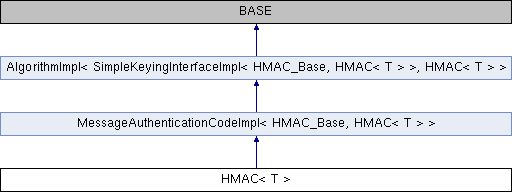 Inheritance diagram for HMAC< T >:
Inheritance diagram for HMAC< T >:Public Member Functions | |
| HMAC () | |
| Construct a HMAC. | |
| HMAC (const byte *key, size_t length=HMAC_Base::DEFAULT_KEYLENGTH) | |
| Construct a HMAC. More... | |
| std::string | AlgorithmName () const |
| std::string | AlgorithmProvider () const |
 Public Member Functions inherited from AlgorithmImpl< BASE, ALGORITHM_INFO > Public Member Functions inherited from AlgorithmImpl< BASE, ALGORITHM_INFO > | |
| std::string | AlgorithmName () const |
| The algorithm name. More... | |
Static Public Member Functions | |
| static std::string | StaticAlgorithmName () |
 Static Public Member Functions inherited from AlgorithmImpl< BASE, ALGORITHM_INFO > Static Public Member Functions inherited from AlgorithmImpl< BASE, ALGORITHM_INFO > | |
| static std::string | StaticAlgorithmName () |
| The algorithm name. More... | |
Static Public Attributes | |
| static const int | DIGESTSIZE =T::DIGESTSIZE |
| static const int | BLOCKSIZE =T::BLOCKSIZE |
Detailed Description
template<class T>
class HMAC< T >
HMAC.
- Template Parameters
-
T HashTransformation derived class
HMAC derives from MessageAuthenticationCodeImpl. It calculates the HMAC using HMAC(K, text) = H(K XOR opad, H(K XOR ipad, text)).
- See also
- HMAC
- Since
- Crypto++ 2.1
Constructor & Destructor Documentation
◆ HMAC()
template<class T >
|
inline |
The documentation for this class was generated from the following file:
